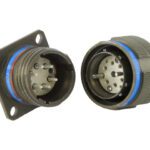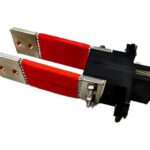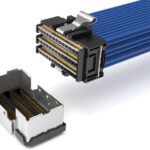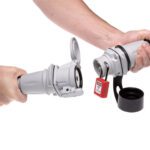What is ISOBUS?
Meet the Connector: ISOBUS
ISOBUS specifies a method of interoperability between electronics systems for agricultural and forestry equipment, greatly simplifying the process of connecting equipment from different manufacturers. Also known as ISO11783, this standard specifies a method of interoperability between electronics systems for heavy duty equipment types that use separable implements. Technical development of the standard began in 1991 when ISO established the SC 19 agriculture electronics group. The standard was introduced in tractors and implements in 2001.
Prior to this, the process of connecting equipment from different manufacturers involved swapping out harnesses and monitors, plus the installation of control boxes, multiple connectors, adaptors, and harnesses. ISOBUS provides a plug-and-play connectivity solution that ensures full compatibility of data transfer. If both pieces of equipment are compatible with ISO11783, the electronic control units (ECUs) can communicate and share information via a CAN bus, essentially allowing them to operate as one machine.
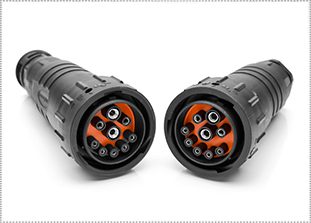
PEI-Genesis stocks Amphenol Sine Systems DuraMate AHDP ISOBUS 91 Series, environmentally sealed, multi-pin, heavy duty, circular plastic plugs & receptacles. The economical, quick-connect, circular bayonet locking system is designed to meet ISO11783 standards.
ISOBUS uses a virtual terminal to control all ISOBUS-compatible implements and can be connected to a GPS unit for navigation functions and to monitor and control modules to manage functions like seed and fertilizer output. ISO has been widely adopted in Europe but has only become standard on agricultural equipment in the U.S. in recent years.
ISOBUS
Based on CAN bus, which has also been used in the agriculture industry for many years, the ISOBUS communication protocol is compatible with SAE J1939-11 and -13, the worldwide serial data bus communications standards for trucks, buses, and off-road, construction, and marine vehicles.
ISO11783 allows one nine-pin circular connector interface to be used in tractors for displays, farm management software modules, and farming implements. It specifies physical characteristics for an ISO box (box interface) and three connector pairs. The ISO box enables signal transmission between, for example, tractors and implements. The connector pairs include:
- A nine-pin circular connector mounted on the outside rear-end of agricultural equipment. A proprietary PCB divides the nine-pin input into two 4-position connectors located inside the equipment. The ISO box mates with a nine-pin plug with a breakaway function that prevents damage from an accidental drive-away disconnect.
- A bus extension (in-cab) connector allows the addition of other ISOBUS equipment to the existing bus system, extends the bus signal lines of the implement bus within the farm equipment, and enables the attachment of the virtual terminal.
- The diagnostic connector, compatible with SAE J1939-13, is a nine-pin circular connector that links the safety-critical and non-critical sub-systems, including engine, braking, transmission, emission, and tracking systems, data loggers, and test equipment for troubleshooting and maintenance of the ISO network. In tractors and similar equipment, it is typically located in an easily accessible area in the cab
Other specified physical characteristics are:
- Serial data network (CAN2.0B) for control and communications
- Data handling and file transfer
- Minimum functionality of certain devices on the network
Because the types of equipment that rely on ISOBUS operate in harsh environment conditions, components must be ruggedized to protect their performance and longevity against weather extremes, UV exposure, temperature fluctuations, and the presence of chemicals, moisture, and particulates (including mud). They must also be able to resist shock and vibration and be IP sealed against ingress of contaminants, including fluids, under pressure.
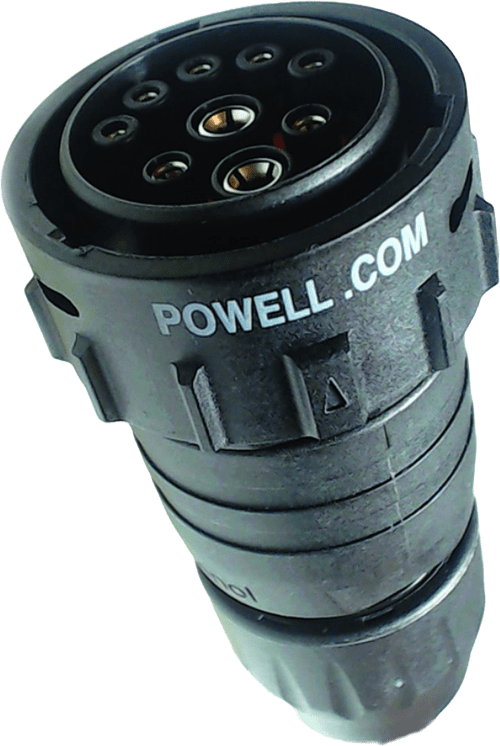
Powell’s ISOBUS Implement Connector is a new design for the implement connector specified in the ISO11783 protocol. The IBIC creates the electrical connection of implements to the tractor or other agricultural vehicles to transfer power, signals, and CAN bus communication between the tractor and implement.
Deutsch Group SAS, founded in California in the late 1930s and acquired by TE Connectivity in 2012, was one of the first connector manufacturers to be certified to the standard, and has been supplying production quantities of ISO11783-certified products to European manufacturers of agricultural tractors and implements since 2002.
Suppliers
Suppliers include PEI-Genesis, Phoenix Contact, Powell Electronics, TE Connectivity, Amphenol, US CONEC, HUBER+SUHNER
Like this article? Check out our other Meet the Connector and Harsh Environment articles, our Transportation Market Page, and our 2023 and 2022 Article Archive.
Subscribe to our weekly e-newsletters, follow us on LinkedIn, Twitter, and Facebook, and check out our eBook archives for more applicable, expert-informed connectivity content.
- What are ARINC 801 Connectors? - April 9, 2024
- MIL-Spec Rectangular Connectors Product Roundup - April 9, 2024
- April 2024 Connector Industry News - April 9, 2024
